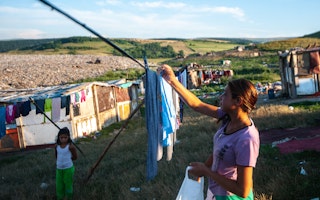Roma Exclusion: No More Business As Usual
By Bernard Rorke
As diplomats, donors, bureaucrats, politicians, and others head for Cordoba to attend the 2nd EU Roma Summit, it’s time to recall European Commission President Barroso’s warning at the first summit in 2008. He declared that when it comes to the Roma issue "there is no place for a laissez-faire or business-as-usual approach." Well, in the interim, and beyond the rhetoric, it has been business as usual, as so little has changed in the lives of far too many of Europe’s largest and most deprived ethnic minority.
Between two summits, we have witnessed a shocking wave of murderous gun and bomb attacks on Roma settlements across Hungary. Men, women and children were among the dead and the maimed. We have seen far-right extremists make electoral gains on an explicitly anti-Roma agenda and a hardening of popular hostility towards Roma.
It’s been business as usual when it comes to forced evictions, and forced returns to Kosovo. Between two summits it’s been business as usual when it comes to school segregation. The routine of routing Roma children into special schools for the disabled continues, despite the ruling of the European Court of Human Rights that this is illegal and discriminatory.
It’s time for Europe to break with old habits of segregation, exclusion, discrimination and denial of basic human rights to Roma. It’s time to develop a comprehensive framework strategy to combat the abject poverty that millions of Roma face today; time for a strategy that provides for equal opportunities, that guarantees equal access to the basic services necessary to lead a life with dignity.
We need a strategy that puts the rights and well-being of Roma children at the very heart of human development. In a region characterised by aging populations and falling birth-rates, the Roma constitute the youngest and fastest growing demographic segment of the population. Apart from the ethical imperative, our societies simply cannot afford another lost generation of excluded young Roma.
We are at the mid-point of the Decade of Roma Inclusion. For all its shortcomings, the Decade provides a viable working template for an EU Roma Policy. Now is the time for the European Commission to embrace this framework, coordinate existing efforts to best effect in a bold, shared endeavour to wash away the dirt of prejudice that besmirches any credible notion of what we might cherish as European values.
We recognise the efforts made to date by the European Commission, and acknowledge the progress that has been made. But the policy response we need from the Cordoba Summit must be proportionate to the scale of the problem. "Business as usual" in the face of such levels of deprivation and exclusion could precipitate a social crisis. This can be averted. Indeed, this must be averted. Towards this end we need a road map for Roma inclusion that will make a difference to the lives of the poorest of the poor. We need a concerted, coherent policy response that finally makes amends for centuries of injustice towards our fellow European citizens.
Until December 2013, Bernard Rorke was international research and advocacy director for the Roma Initiatives Office.


